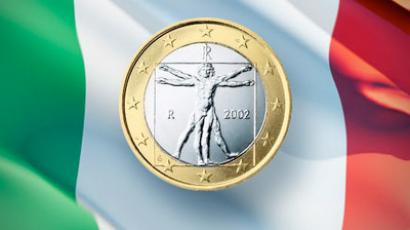EU and IMF agree to give Greece 109 billion euros

Leaders of the EU member states, together with the IMF, have come to agreement on the allocation of 109 billion euros to help Greece out of the financial crisis that might put the very existence of the euro under question.
It is also expected that banks and private investors will add some 40 billion euros to that sum within the next three years.The decision was made late in the evening on Thursday at an urgent summit in Brussels, and before being ratified must pass approval by the EU parliament.Greek Prime Minister Georgios A. Papandreou attended summit and, as expected, greeted the decision.The accord to allocate billions more to stabilize the lamentable economic situation in Greece only became possible once the country introduced an anti-crisis package, including cuts in budget expenditures totaling 14.32 billion euros, raising taxes by 14.09 billion euros and finding other savings totaling 28 billion euros within the next five years.It is the second bailout of Greece. It follows a 110-billion-euro loan given to Greece in 2010, which proved to be insufficient to solve Greece’s financial problems and pull the country, with its nearly 350 billion euros of sovereign debt, out of the deadlock.However, French President Nikolas Sarkozy warned that this model would not be repeated for other struggling eurozone economies."What we are doing for Greece in terms of (debt) sustainability, we will not do for any other country of the eurozone," Sarkozy said. "We are saying this loud and clear: Greece is a specific case and this is a significant political decision.”The gathering has also ruled that the EU should reduce reliance on external credit ratings, taking into account the recent moves by Moody’s and other US agencies, which downgraded the sovereign debts of the EU countries hit by the financial crisis. The EU Commission has been assigned to make concrete proposals on the issue.On the eve of the summit, euro ratings started climbing upwards in anticipation of fresh anti-crisis measures. European markets saw an increase in euro ratings by as much as 1.12 percent.The measures discussed at the summit will also include help to other ailing EU economies, like extending the average maturities not only for Greece, but Portugal and Ireland’s official loans as well to 15 years from original 7.5 years, at an interest rate of 3.5 percent, which is a 1 percent decrease from the previous 4.5 percent.
Nevertheless, says MEP Paul Nuttal from the UK Independence Party, despite the rising hopes the only solution for Greece is to leave the eurozone.“What Greece needs to do is it needs to come out of the euro,” he said. “It needs to be able to devalue its own currency. It needs to be able to set its own exchange rates and it needs to get its economy moving.”“Let us look at the last example of a major country which defaulted, which was Argentina,” Nuttal added. “It defaulted in 2001. From 2002 to 2006 its economy grew by 65 percent, so default for Greece would not be the end of the world.”
Economist Marc Faber, founder of The Gloom Boom & Doom Report, says the best solution for the eurozone is do downsize by dropping also-rans.“The best solution to the EU’s problem would have been for the strong countries to kick out the weak countries of the south – Portugal and certainly Greece – possibly also Ireland and Spain, and essentially just focus the EU on the very strong countries. That would have made more sense in my opinion. If you have a corporation that is in trouble, the best is to restructure the debts, and everyone has to take a loss, even the bond holders. But we have one bailout after the other and basically it happens at taxpayers’ expense, even though they may be realize it,” he told RT.













